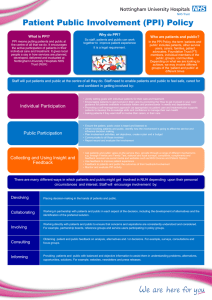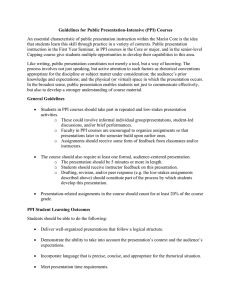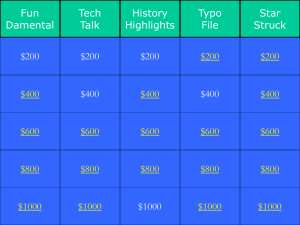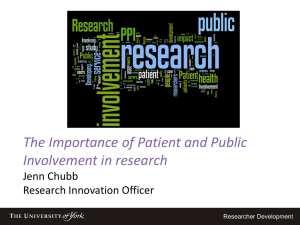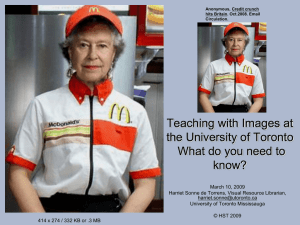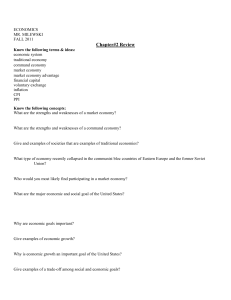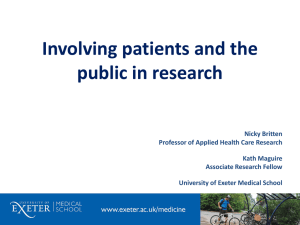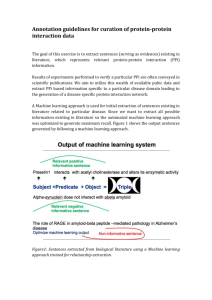External Evaluation Department of Political Science and Public Affairs Public Policy Institute
advertisement
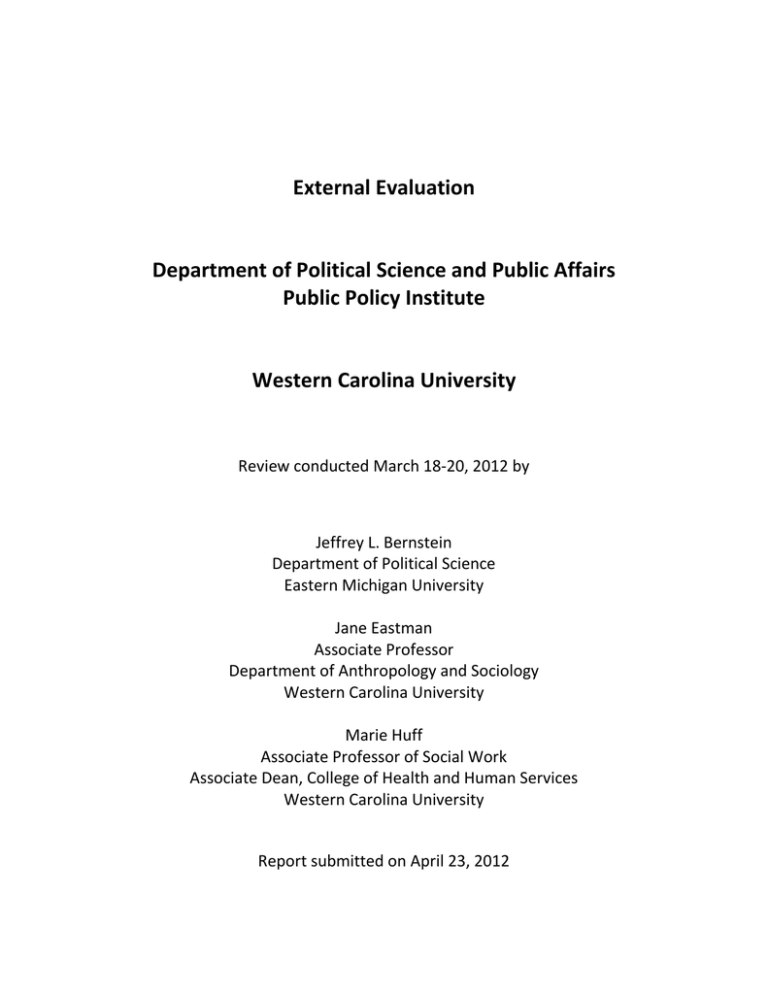
External Evaluation Department of Political Science and Public Affairs Public Policy Institute Western Carolina University Review conducted March 18-20, 2012 by Jeffrey L. Bernstein Department of Political Science Eastern Michigan University Jane Eastman Associate Professor Department of Anthropology and Sociology Western Carolina University Marie Huff Associate Professor of Social Work Associate Dean, College of Health and Human Services Western Carolina University Report submitted on April 23, 2012 I. Introduction An external review team participated in a program review and assessment for the Department of Political Science and Public Affairs, and the Public Policy Institute, on March 1820, 2012. The review team consisted of one external reviewer, Jeffrey L. Bernstein of the Department of Political Science, Eastern Michigan University, who chaired the review. The two internal reviewers were Jane Eastman from the Department of Anthropology and Sociology, and Marie Huff, from the Department of Social Work and Associate Dean of the College of Health and Human Sciences, both from Western Carolina University. As part of the review process, the team met with Interim Provost Beth Tyson Lofquist, Interim Dean Gibbs Knotts of the College of Arts and Sciences, Interim Department Head Chris Cooper and Interim Director of the Public Policy Institute Todd Collins. The team also met with the faculty and the adjunct faculty in the department, with current students and alumni from the department, and with Vickey Wade of the Local Government Training Program, which is affiliated with the department. Finally, the review team met with David Onder and Melissa Wargo, who direct the program review process at Western Carolina University, in order to help develop this assessment. II. Analysis of Program A. Overview The Department of Political Science and Public Affairs offers a major in political science. The department also offers a Master’s Degree in Public Administration – that program is evaluated and accredited separately by the National Association of Schools of Public Affairs and Administration, and is not evaluated here. The Department of Political Science and Public Affairs is heavily involved in the new International Studies program; the director of that program, Professor Niall Michelsen, is a faculty member in the political science department. In addition, Professor Jen Schiff serves on the advisory board for this program. The minor in International Studies is currently housed in the department, and, beginning in Fall 2012, the new major in International Studies will be housed there as well. The International Studies program will undergo its own review in the coming years. In addition to these programs, courses offered by the department are a prominent part of the university’s Liberal Studies requirements; departmental course offerings can be used to fulfill requirements within both Social Sciences and World Cultures, and the department offers courses that count for the Freshman Seminar requirement in the program. The department’s courses are also offered in service to the College of Education, particularly for students seeking teacher certification in social studies. Students in the Bachelor of Sciences in Education program in Social Studies take one required course and twelve elective courses from the department. The Public Policy Institute works in three different areas: (1) outreach and applied research of interest to those who make policy; (2) civic education; and (3) engaged student learning. While the PPI is housed within the Department of Political Science and Public Affairs, it works with faculty across campus as the university’s applied research arm for public policy issues. The PPI helps to increase the visibility of the department and of the university, and also plays a critical role in influencing policy debates across the region, and across the state. In short, both the Department of Political Science and Public Affairs and the Public Policy Institute are involved in the campus in ways that move far beyond merely teaching students majoring in the discipline. Both units are critical players in helping the university and the college achieve their mission and strategic visions. B. Curriculum Political Science is, of course, a standard academic discipline. The course offerings from the department, and the programmatic work that it does, are appropriate for the student body of Western Carolina University, and also fit well within the professional standards of the discipline as articulated by the American Political Science Association. Students seeking to learn about the government and politics of the United States, or of other nations, or about the ways nations interact with one another, or about the administration of national, state and local government, or about most of the other traditional subfields of political science, are wellserved by this department. Of course, with a small faculty, the department is able to offer a wider range of courses in some areas than others – we explore this point below when we discuss the staffing needs of the department. As part of this review process, the review team interviewed alumni of the program, as well as current students. The students offered effusive praise of the department for its student-centered focus, and for the strong teaching and mentoring the students received. While the students we spoke to were, of course, a non-representative sample, we came away impressed by them and how thoughtful they were in assessing the program. The department has clearly cultivated a group of students and alumni who feel a debt of gratitude to the program for the training it offered them, and the department would do well to continue to expand its efforts to keep in touch with these students and maintain these relationships. The department’s Facebook page is one impressive way this has been done; an expanded alumni newsletter might be another way to do this. While much of the political science curriculum is fairly standard, and would look the same across all political science departments, we do note one unique and interesting aspect of this department’s programming. We refer here to 1 + 1 + 1 part of the major. In this series of one-credit courses, students first receive an introduction to the field of political science, then have the opportunity to engage in a civic engagement activity, and finally take a one-credit course in which they put together an academic portfolio, while also learning more about career options open to them with the political science degree. The three one-credit courses add up to three credits, thus becoming the equivalent of one course. All of these courses are required for all students. The review committee applauded the efforts of the department in offering these classes. An “Introduction to Political Science” course is offered by some (but not all) political science departments – while it may not hold together well as a full, three-credit course, this brief one-credit introduction does serve to help students see how the whole discipline fits together. This might be especially useful as the field of political science becomes more and more balkanized between its different subfields. In addition, the review committee was also impressed by the department’s requirement that students engage in some civic engagement activity (helping to connect the classroom to the real world) and by the interesting projects that professors have used to address this requirement. Finally, the review team thought that the last course effectively helps the department with assessment (more on that below) and with helping students prepare for their lives after college. In a telling conversation, the older alumni (some of whom graduated from the program 10-15 years earlier) were not aware of this requirement. They recommended to the department that activities be undertaken that would bring students into the community surrounding WCU, and also to help prepare them for the world after college. More recent alumni told the older alumni of the 1 + 1 + 1 component, which met with favor among the older alumni. They were glad the department had instituted this. Current students, however, were less pleased with the 1 + 1 +1 component. When we probed deeper, we noted that this dissatisfaction stemmed from those who had to take the first course (introduction to the discipline) and the final course (portfolio) either at the same time or very close to one another. The content of the two courses admittedly overlaps. In theory, this seems not to be a problem – an introduction to the discipline taken in the first or second year, and a return to some of these topics as a senior, seems an ideal way to spiral the curriculum and reinforce these lessons. However, for students who transfer in to WCU as juniors, taking both courses so close together seems wasteful. We would therefore recommend that the department figure out a way to handle this eventuality – perhaps by waiving the first of the 1 + 1 + 1 courses for students who transfer in with a large number of credits, and then replacing that course with a second credit of the civic engagement activity. Three additional points should be considered in this discussion of the curriculum. First, many of the alumni suggested that they did a lot of writing in the program, mostly within the genre of the ten-page term paper. While students did appreciate the opportunity to write often, and gain practice with that essential skill, alumni who are out in the “real world” suggested that developing skills in writing shorter papers (short policy memos, for example) might be more useful than writing so many term papers. The department may want to consider the range of writing skills they want students to develop, and the genres they want students to master, and incorporate them more explicitly into classes (and into the portfolio requirements). Second, we applaud the department for its requirement that students participate in one “engaged activity” in the major. Currently, this requirement can be met either by participation the department’s growing Model United Nations course, or by doing an internship. We applaud the department for doing so much to enhance student engagement – we are also supportive if ideas expressed within the department to also offer options for students with Mock Trial and Mock Congress courses. These options would take a strong idea and offer more ways in which students can fulfill the requirement, and engage more in their major. Finally, one lingering issue concerns the awarding of either the Bachelor of Arts or the Bachelor of Sciences degree to students majoring in political science. At this point, students receiving the BA are required to complete four courses in a foreign language, while students earning the BS are required to complete a second methodology course. The students with whom we spoke suggested that the second methodology course, which often focuses on more applied topics, would be useful for any student completing the major. This raises a question about whether students who do not do the BS are being shortchanged in their political science education. As a committee, we have formed no definite views on this, except to say that we found the possible second methods course to be a good idea for majors. We recommend, however, that the department consider if this is an issue they wish to address as a faculty and, if so, that they devote some time to settling this challenge. C. Assessment In order to assess the work it is doing, the Political Science Department frequently discusses curricular matters in its department meetings. The faculty really do seem to engage in a process of determining what they want their students to learn, and then to asking hard questions about this topic, particularly as they pertain to curricular issues. In our conversations with the Department Head and with the faculty, the language of assessment was familiar to them, and was something they had carefully considered in the work of the department. We urge the department to take the next step in the assessment process. The portfolio process enables the department to gather useful information about their students and what they are learning. A next step is to give further attention to student learning outcomes, perhaps taking advantage of the assessment resources on campus. The portfolios that students submit are a potentially valuable assessment document; it appears they are used now in an informal way to examine student learning. We believe it would be worth some time to study the portfolios systematically, generating a rubric against which to assess them. Given the nature of the department, some time spent systematically examining these portfolios could generate further ideas for how to enhance the student experience in the department. Unlike in some academic departments, time spent in this department on assessment will not have to bear the “start-up” costs of convincing faculty that this work is important, and that faculty should spend their time doing it. In fact, given the significant work members of the department have done in the scholarship of teaching and learning, we could imagine this department becoming a national leader in conversations about teaching and learning in political science. We encourage the department to pursue this sort of work. III. Analysis of Staff The Department of Political Science and Public Affairs has an FTE of nine faculty members. To put it very simply, it is an extraordinary department. First, in terms of teaching, the department has a very strong reputation for exceptional teaching. Multiple faculty members have either won or been nominees for the university’s highest teaching awards. In conversations with current students, and with alumni of the program, the quality of teaching was consistently commented on in a positive manner. This is clearly a student-centered department. In addition, the faculty in the department can all be considered research active. The department’s evaluation document lays out an ambitious yet realistic plan for what faulty must achieve in research. Given the teaching loads they face, the research productivity of the department as a whole is quite impressive. Compared to similar departments and regional institutions, the extent to which these faculty are active within their discipline and successfully publishing, and engaging in acts of public scholarship, is commendable. Currently, there is a significant amount of transition within the department, as evidenced by the following: • The most recent Department Head, Gibbs Knotts, left the position to become Interim Dean of the College of Arts and Sciences. The current Department Head, Chris Cooper, was serving on an interim basis at the time of the site visit. While it seems clear the department is pleased with his leadership and would like for him to continue in this role, and that the administration supports this, the appointment has not be made permanent yet. The stability of the department would be enhanced by doing so. • The current Director of the Public Policy Institute, Todd Collins, is also holding the position on an interim basis. Once again, it seems that making him permanent director is just a matter of time. The Institute would be enhanced by having this position held on a permanent basis. • Two faculty members, Assistant Professor Dan Bromberg and Professor (and Interim Dean) Gibbs Knott are leaving. While the department is hoping to fill these positions in an ongoing search, the prospect of a department of nine being down to seven for any length of time should certainly be a daunting one. As we write this report, searches are in progress, and the department hopes to fill at least one or two positions this year. Even if the department were to be fully staffed, the nine faculty members have a significant amount of release time due to their administrative roles. The following faculty all receive some release time: • Chris Cooper, (Interim) Department Head – released from 3 courses per year (out of a 3-3 load) • Todd Collins, (Interim) Director of the Public Policy Institute – released from 3 courses per year • Roger Hartley, Director of the MPA Program – released from 2 courses per year • Niall Michelson, Coordinator of International Studies Program – released from 1 course per year We note that the release time being offered for these responsibilities seems quite reasonable; it is hard to imagine serving in any of these positions with any less release time than that which is provided. Still, the accumulation of these course releases total 1.5 FTEs, reducing a department of nine to one that has the “teaching power” of seven-and-a-half faculty. For a department this size to run an undergraduate program in political science, contribute to the International Affairs program, and run an MPA program is a tremendous program. The department is able to do this in part by making strategic use of one full-time lecturer (Fred Fisher) and a small but effective stable of adjuncts. Their work in adding to the teaching capabilities of the department was widely praised during our visit, as was the way the tenure-stream faculty have welcomed these adjuncts and valued their contribution to the department. In recent years, the department took one of its significant weaknesses and turned it into a strength. What had been very sparse course offerings in comparative politics and international relations is no longer, as the department has now added Jen Schiff and Na’ama Nagar to fill out these course offerings. The presence of these instructors means the department can now offer courses in Asian Politics and in Mideast Politics, two areas of increasing student interest and of increasing need for political science to cover. The department has also remained strong in public administration; while that strength may be temporarily weakened if this year’s searches are not successful, the ultimate completion of these searches will enable the department to adequately meet its needs in both undergraduate and graduate public administration. While a close examination of this program is beyond the scope of this report, the department seems reasonably well-staffed to continue offering its MPA Program. From a staffing perspective, we have identified two holes in the department, as follows: 1. The department currently does not have a political theorist. Professor Niall Michelsen teaches an introductory political theory course, but there are no upper – level courses offered in this area. The department at WCU is not unique in this situation – in general, for a department of this size, having one full-time theorist might be overkill. The department is fortunate now that it has a faculty member who can stretch himself to teach in this area. It is hard to recommend that the department hire a theorist, but it would be well-served to keep an eye out for lecturers who might be able to augment the theory offerings, or for existing faculty members who might be able to stretch themselves to teach in this area. 2. The department is strong within American political institutions (Congress, presidency, courts), as well as in public policy and public administration. It is comparatively weaker in the area of public opinion/political behavior. There are occasional course offerings in this area (for example, Chris Cooper will be teaching an elections course in the fall 2012 semester). But there are no courses on the books in areas such as public opinion, voting behavior, or political psychology. The department would certainly benefit from hiring a new faculty who could teach these kinds of courses. The political science job market in this area is a buyer’s market, so the department could reasonably expect to make a strong hire in this subfield. IV. Analysis of Operational Facilities and Budget The political science department is facing a slight space crunch in the future. If it is successful in making the two hires it is currently attempting, it will find itself short by one office. The department strongly (and appropriately) desires that all of its faculty, as well as non-tenure track lecturers and adjuncts, will have their offices located in the same area. This has been the case until now, which enables the lecturers to feel they are very much a part of the department. The department would certainly benefit from a little more office space. One thing the department lacks is a common space for students to come together and hang out with one another. There is not a student lounge near the department that can be used for this purpose. In addition, as the university has begun to use different software for scheduling classes, the department’s classes are located all over the campus. The downside of this is that students in political science classes have fewer places to congregate; if, for example, all political science classes were located in one common area, the “passing times” between classes can offer opportunities for students to connect with one another (and with faculty). Figuring out a way to give departments a set number of rooms that they themselves schedule might be an easy way to help bring its students and faculty together a little bit more. A political science student/faculty lounge would be ideal, but is unlikely to happen in the current space environment. The Political Science Department Office, and its discretionary budget, seem adequate to its mission and the tasks at hand. Department staffing also seems to be at an appropriate level for a department of this size. V. The Public Policy Institute (PPI) The Public Policy Institute occupies a nice space right near the department, fostering strong connections between the PPI, its students, and the department. The PPI is currently staffed by a half-time director, a quarter-time administrative assistant, and four graduate student assistants. We believe that the PPI manages to accomplish a great deal given its level of staffing. The PPI has managed to get the university’s name “out there” in public policy debates and in elections; affiliated faculty are frequently in the news and are well-regarded in the community. For a small investment of resources, the PPI returns a great deal to WCU. We do think, however, that the budgetary challenges facing the PPI ought to be addressed. The PPI has typically operated with a base budget of around $12,000 (above personnel costs). Two years ago, after another unit on campus closed and was folded in to the PPI, the budget soared to $40,000. Last year, it returned to its original base, which appears to be about the expected level of support for the immediate future. In this case, the ability of the PPI to achieve its core mission is directly affected by the size of its budget. As one example, the PPI once ran a program in which it invited faculty from around campus to be “Public Policy Fellows” and work with PPI on public policy-related issues. This program, which was well-regarded at the time, was a casualty of the reduction of the budget two years ago. A similar range of high-quality programs could be conducted by the PPI if its budget would allow for it. Unlike an academic department, the Public Policy Institute is in a position to facilitate revenue-generating programs in order to raise its own funds to help support its programming. At the external review, we discussed possibilities for doing so. One option might involve running programs on teaching public issues, which could be pitched at high school teachers looking for Continuing Education Credits and willing to pay for high-quality programs. We leave it to the PPI staff to think more about revenue-generating programs that can be attempted, both as a way to support other initiatives, and as a way to further the reputation of the PPI in the broader community. One other option that we believe the PPI ought to explore would be to pursue more grant writing. While this is admittedly difficult with a small staff, we would encourage the PPI Director to have MPA students engage in some grant writing activity. Perhaps the PPI could work with some students in a grant writing class within the MPA curriculum to have them do their projects for the benefit of the PPI? We would encourage the PPI to explore this option, and other options, as another way to generate much-needed funding. VI. Summary of Recommendations In this final section of the report, we detail our recommendations for the Department of Political Science and Public Affairs/Public Policy Institute. We divide our recommendations into those that can be implemented or acted upon by the department, and those for which it needs support from other areas of the university (noting, of course, that the wall between these two categories is somewhat porous). Further discussion of each of these recommendations is found throughout the report – this conclusion is merely a summary listing of them. Before doing that, however, we wish to state once again how impressed we are with the Department of Political Science and Public Affairs, and with the Public Policy Institute. Reports like this one frequently, and appropriately, harp on things the units can do to improve. Such recommendations hopefully are valuable for the units in question. Therefore, with the risk that this report will be seen as harping on the negative, we wish to clearly indicate now how impressed we were with the department and its faculty. This is a department that seems to be well-known on campus, and visible in the larger community. The students and alumni with whom we spoke reported positive experiences in the department, and the faculty with whom we met were quite impressive by any standard. The research productivity among the faculty is very high considering the teaching load and other professional obligations they all confront. In conclusion, we note the comment made to us by Interim Provost Beth Tyson-Lofquist at the beginning of the site visit. This is, in fact, a “high-flying department.” We were profoundly impressed by what they have been able to do, and excited to contemplate for them an even stronger future. A. Recommendations for Things the Department Could Do 1. Assessment: We are pleased to note the presence of a culture of assessment in the Department of Political Science and Public Affairs. Faculty in the department are very clearly committed to student learning, and to careful investigations of the same. We would like to see the department keep the culture of assessment going, but try to do more to define student learning outcomes, and to use the portfolios to more systematically assess student learning. We would encourage the department to use the existing assessment resources on campus to help it in these tasks. 2. PPI: We believe very strongly in the mission of the PPI, and note how strong its programming has been in previous years. We encourage the PPI to explore programs that might generate revenue, including the possibility of charging for some projects. We also encourage the PPI to look to students for revenue generation, perhaps by having MPA students do grant writing projects to help support the PPI. 3. 1 + 1 + 1: The committee is very impressed with the goals of the 1 + 1 + 1 program, and with what is being done to help achieve these goals. We believe, however, that the department should take steps to make sure that the program meets the needs of students who enter WCU further into their university careers, and hence eliminate some of the redundancy found in the first and third classes. It would also be important to formalize how teaching these courses might fit into a faculty member’s workload. 4. BS/BA Issues: The issues of requirements for the Bachelor of Science versus Bachelor of Arts degree pervade the university. Within the department, there is some concern about how the department should draw the requirements for each degree. We would encourage the department to determine if it needs to address this issue and, if so, to develop a plan for doing so. 5. Engaged Activity: We applaud the Engaged Activity requirement in the political science major, which currently can be met through participation in Model UN or an internship. We would encourage the department to expand these options through adding offerings such as Mock Trial or Mock Congress. 6. Student Outreach: While the department does some outreach to its current and former students through a Facebook page, we would encourage it to do even more by developing an alumni newsletter, and by considering other forms of outreach to what we imagine is a very satisfied group of alumni. B. Recommendations for Things that Could Be Done for the Department 1. Faculty Positions: The Department of Political Science and Public Affairs could use at least one more faculty line, ideally in public opinion/political behavior. Such a hire would enable the department to offer a wider range of courses in an important area of the discipline. Since faculty trained in this area are usually well-versed in teaching research methods, the department could benefit in two ways from this position. In order to be competitive in such a hire, the university will need to address larger issues of faculty compensation. We note that as the department’s reputation continues to be high, and as the international studies program grows, the need for more faculty lines will become especially acute. 2. Public Policy Institute: While this report has identified a variety of ways for the PPI to generate its own additional revenues, the university ideally should put more resources into the PPI. The PPI generates a lot of goodwill for the university, and as such, the university would realize a great deal of return on its investment if it offers more support for the PPI. 3. Stability in Leadership: During our review, the committee met with an Interim Provost, Interim Dean, Interim Department Head and Interim Director of the Public Policy Institute. There are differing reasons that all of these positions are held by interims; in the immediate future, we expect the latter two incumbents to have the Interim removed from their title. Overall, more stability in leadership can only help the department, and the PPI. 4. Facilities: The department can use at least one more office (and perhaps more, if it gets additional faculty lines in the future). In addition, it would be wonderful if the department were to get a common space for students and faculty to congregate. At the very least, if the department were able to teach its classes in a common area, that might provide some opportunity for informal interactions between faculty and students, and between students themselves. This would only enhance the student-centered nature of the department.
